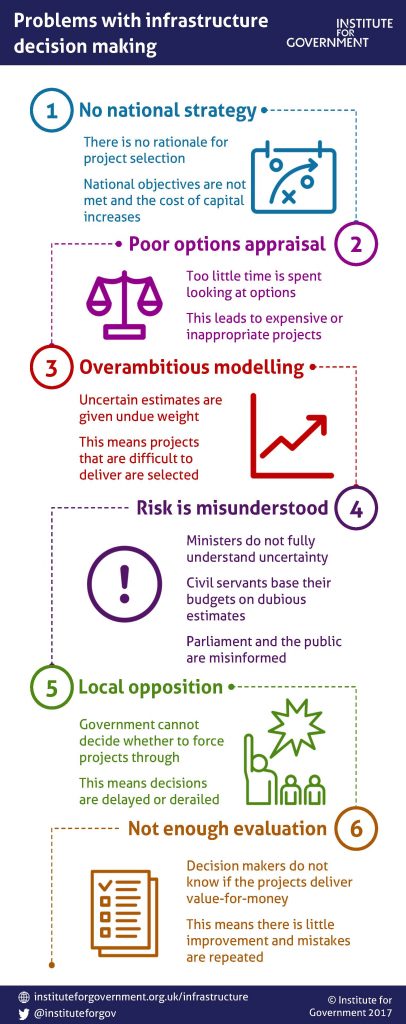The Institute for Government has produced a report “What’s wrong with infrastructure decision making?”, which has looked into six infrastructure projects. It will come as no surprise that becomes another one in a long list of independent reports which is highly critical of HS2.
The report warns that;
“Well-judged infrastructure investment contributes to a successful modern economy. It can support better economic performance by helping raise productivity and creating jobs. But poor investment decisions could lock the economy into inappropriate infrastructure systems for many years, with significant harmful effects on future prosperity. Bad investments can result in white elephants – projects that waste public money and fail to deliver the economic benefits a better decision could have brought about.”
It identifies six shortcomings which make it difficult for government to make sound, timely infrastructure decisions:
- There is no national strategy for infrastructure investment.
- Government does not devote enough attention to assessing early options.
- The more ambitious the forecast, the more questionable the model.
- Ministers and senior civil servants can fail to understand project risk.
- Government finds it difficult to make decisions which create ‘concentrated losers’.
- Inadequate evaluation misses the opportunity to improve future projects.
It is of no surprise that in their case study, HS2 ticks all of these six boxes of failure. HS2 also matches the well-established evidence demonstrating the problems with infrastructure policymaking:
- short-sightedness and lack of overall strategy
- serious weaknesses in the evidence base and modelling processes, on occasion leading to poor choice of projects
- shortcomings in government’s ability to understand and handle risk
- failures to comply with the guidance in the 2003 Treasury Green Book which aimed to avoid exactly these pitfalls.
With specific reference to HS2, the case studies state:
“ HS2 provides an excellent illustration of the challenges of making infrastructure decisions in the absence of a strategy. Since it was first mooted in 2008, HS2 has repeatedly been criticised as a ‘solution looking for a problem’. Its objectives have repeatedly seemed to shift. Initially suggested as an employment stimulus, it has subsequently been sold as a way to cut travel time, reduce overcrowding on the West Coast Mainline and regenerate the West Midlands.”
HS2 provides an excellent illustration of the challenges of making infrastructure decisions in the absence of a strategy. Since it was first mooted in 2008, HS2 has repeatedly been criticised as a ‘solution looking for a problem’. Its objectives have repeatedly seemed to shift. Initially suggested as an employment stimulus, it has subsequently been sold as a way to cut travel time, reduce overcrowding on the West Coast Mainline and regenerate the West Midlands.”
“This confusion of purpose has led to suggestions that the choice to build it is as much political vanity as cost-effective investment in regional regeneration. Critics have questioned the robustness of the data and forecasting used in the Government’s business case for HS2, as well as the impact on journey times, carbon emissions, homes, communities and habitats. Successive governments have struggled to manage competing interests and, in particular, to foster informed, evidence-based discussion with those who will lose out from its construction.”
“The lack of clarity over the purpose of HS2 has led to lengthy delays in decision making, as the Government has reworked its analysis and communications strategy, at significant cost, to deal with parliamentary and public opposition. On top of this, critical public and parliamentary stakeholders remain uncertain about whether HS2 represents the most cost-effective solution (not least because there is such disagreement about which problem it is aiming to solve), or good value for money. In a 2011 review of HS2, the House of Commons succinctly summarised the problem:”
‘The absence of a transport strategy makes it hard to assess how HS2 relates to other major transport infrastructure schemes, regional planning and wider objectives, such as bridging the north-south divide. This seems to have deterred some groups, which might otherwise have supported HS2, from doing so. The biggest single transport investment proposed in this parliament should be grounded in a well thought-through strategic framework and we are disappointed that the Government has not developed a strategy.’
“HS2 has repeatedly come under fire in relation to whether it will meet one of the objectives that has been mentioned most often: ‘to build a stronger, more balanced economy capable of delivering lasting growth and widely shared prosperity’. Many have argued that there are far more cost-effective options to meet this objective, such as increasing investment in existing regional connections between northern towns and cities.”
“Dan Durrant, an academic at the Bartlett School of Planning, University College London, argues that the handling of the consultation has only added further fuel to the fire of community scepticism. A committee of the House of Lords agrees. The Lords committee on the phase 1 bill concluded that they could not ‘stress enough the importance of effective and timely public engagement, something which, we were told time and again, could be improved upon’.The scope of local opposition is extensive. The NAO note that HS2 Ltd have had to process around 2,600 petitions through the hybrid bill process, which encompasses only a small part of the overall consultation. There has also been judicial delay, as opponents have resorted to using the legal system. In 2013, a series of challenges were brought against the Government by councils and campaigning groups for failures to comply with environmental regulations, compensation, consultation and other decision-making failures.”
So, another absolutely damning conclusion on HS2, but will anyone in power ever pay any attention?
